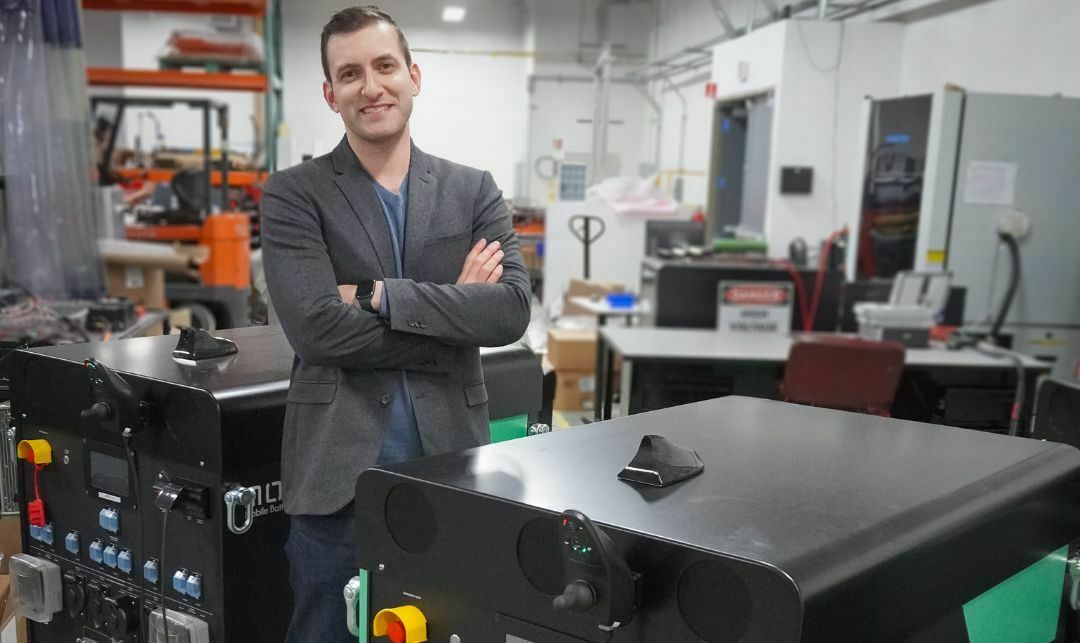When Arcady Sosinov was a boy, the automobile represented freedom, opportunity, and a new way of life. For Sosinov, a Ukrainian immigrant whose family came to New York City in 1991 following the westward wave after the fall of the Soviet Union, the car was the key to upward mobility.
Today, the same holds true. Only now, the 36-year-old entrepreneur is leading the charge on the road to electrification, scaling his ultra-fast charging EV platform to meet anticipated demand—fortified by $125M in Series D funding for his 8-year-old company, FreeWire Technologies.
With the United States, and the world at large, increasingly committed to the transition from gasoline to electric vehicles, the efficiency and availability of charging stations will be a major determining factor in how smoothly that transition goes. FreeWire Technologies’ fully integrated charging technology is taking the lead in solving that dilemma.

FreeWire headquarters in Stockton, California
PURSUING HIS VISION
Sosinov left a successful career in finance in 2015 when he saw the opportunity to develop a technology solution with electric vehicles. It was a bold move that required a certain amount of visionary chutzpah. At the time, the only sites where abundant fleets of electric vehicles were in operation were the campuses of forward-thinking tech companies.
“We landed on this technology solution that packages batteries and charging infrastructure together that enables fast charging, using limited infrastructure,” says Sosinov. “The thing we were solving for was [the] lack of available utility infrastructure.”
He spent his early days hustling Silicon Valley’s Sand Hill Road, pitching the potential of a product for an industry still in gestation. As the CEO and service attendant, he wore a branded FreeWire polo shirt, serviced vehicles, and took meetings while on campus at Facebook, LinkedIn, and various startups.
“Imagine going out in 2015 [and] raising capital for an EV charging business for an industry that didn’t exist,” he recalls. Sosinov landed his first corporate client, LinkedIn, with a parking-lot demo of a prototype that was more a feat of “tinkering” than engineering.
“I found the wreck to a Nissan LEAF in a junkyard in Las Vegas,” he says. “And I had them ship it over to San Francisco, and I tore apart the battery pack and took out the batteries very carefully. … I needed to build this kind of frame for these batteries. So I used fiberglass material that I had worked with before, working on the body of vehicles, [and] kind of craft[ed] this frame around it.”
For the mobile drive system, Sosinov found a used mobility scooter on Craigslist. “I cut the chair of the scooter and mounted this fiberglass frame with the batteries inside of it and kept this remote control attached to the scooter,” he says. Adding an EV charging cord, he then got a solar inverter and attached the battery pack, making sure that the battery pack had the right voltage to go into the solar inverter.
“I went to Stanford’’s campus, and there was a group of angels at some sort of meeting,” he says. “I showed it to them, and I think five of them ended up investing, you know, $50,000 each right off of this little thing that I had built.”
More investors would eventually line up. “We ended up getting a bunch of strategics involved, which was a big shock to me, [and] they’ve been super supportive ever since.”
Today, FreeWire is on a path to bring in $100M in revenue in 2023, which Sosinov says will be a precursor for the company’s anticipated IPO. “We are on a pathway to get there. The revenue is certainly going to be there next year. Now we need to really focus on the margins.”
A public offering, he acknowledges, brings with it an intensified level of accountability. “Once you go public, you become a different company,” he says. “As a private company, my scorecard is my last financing round. Now you get a scorecard at the end of every single day and even if you’re doing everything right, your stock could drop 15% in a day because of macroeconomic conditions.”
Sosinov clearly values the team he has assembled, especially those who stayed the course through some barren periods between funding rounds, showing up to work without the promise of a paycheck. “I know these sound like trite stories, because you might hear them from startup founders all the time, but this actually happened three times,” he says.
“I’m now committed to the people that decided to give up their high-paying corporate jobs and convince their spouses that they should go to the startup with five people in a 1,000-square-foot space. I am hugely appreciative,” he continues. “And that’s one of the things they don’t teach you in business school. They think oh, your expenses are too high, start cutting your human capital […] as if it’s a resource. These are people that have made a promise to you.”

Arcady Sosinov, Founder and CEO, and Jawann Swislow, Co-Founder and CIO, demonstrate FreeWire’s early mobile electric vehicle charging solution (Mobi) at Los Angeles Cleantech Incubator’s (LACI) Global Showcase in 2015
STARTING IN THE GARAGE
The principles that drive Sosinov can be traced back to his family’s first American car after arriving in New York City: a 1980 Chevy Caprice, two-tone dark blue and light blue. “It was beautiful, opulent,” he recalls. It also provided for the family.
His father put the car to work, laboring as a cabbie, seven days a week, 12 hours a day. “That vehicle put food on the table, a roof over our heads,” Sosinov says. The car would eventually represent the bond Sosinov developed with his father, working on the family car together on weekends. “I did a transmission swap at the age of 7 … an engine swap at 11,” he says. “Every weekend was spent working on the car. That was [our] livelihood and we couldn’t really afford mechanics to fix it. We just did it ourselves.”
Sosinov would eventually go off to college, earning an MBA from Berkeley. He landed a job at BNY Mellon and ended up working at GMO, a large hedge fund.
“I was a quant,” says Sosinov. “I was figuring out how the world worked, modeling it, making investment decisions, and making some hedge funds more money. It’s a great job, don’t get me wrong, but you’re not connected to what you’re doing. And this whole time, I always just kept thinking about automotive.”

Boost Charger™ is FreeWire’s battery-integrated ultrafast electric vehicle (EV) charger capable of delivering up to 200 miles of range in 15 minutes. The station pictured is located at an ARCO station in Stockton, California
POWERING THE NEXT WAVE OF EVs
Today, Sosinov sits in the pole position on the next wave of transportation. FreeWire currently offers the most efficient charging option on the market, with models that deliver up to 100 miles on a 10-minute charge and up to 200 miles on a 15-minute charge.
“I think businesses in the space of charging infrastructure are going to be the next oil and gas companies in 20 to 30 years,” he says. His company is leading the charge in the immediate future, but Sosinov also recognizes the need to stay nimble. As the industry starts growing, Sosinov predicts the business will begin focusing on charging infrastructure.
“By 2030 I think 50% of sales of new vehicles [will be] electric,” Sosinov says, referring to U.S. projected goals. “I know there are countries out there with 100% goals. I just don’t think we’re gonna get there, but 50 [is] a lot. And you’re gonna need a ton of public charging infrastructure.”
Highly populated urban centers will be a challenge, he says, as more than 60% of the U.S. population does not have access to off-street parking and accessible charging infrastructure. The problem is even more apparent in Europe, with more than 80% of the population lacking off-street parking access.
“I see this future where you have these—we call them booster orders today,” says Sosinov. He goes on to describe a scenario that sounds like it was inspired from the script of the futuristic 1990 film Total Recall.
“You’ll have these little power nodes all over these urban centers, and they’re basically these glowing bright nodes,” he says. “I think of it as […] these little systems that can both generate and store and deliver power, right, and in a completely decentralized way. Either interacting with the grid when they need to or not interacting when they don’t need to.”
FreeWire is actively working toward that future. “We’re building one of the largest distributed networks of batteries the world has ever seen,” he says. “We’re just doing it quietly. In the next quarter, [we are] deploying the largest distributed energy storage system in British Columbia. And we’re doing it by selling EV chargers, interestingly enough. But we’re using our EV chargers as these distributed batteries.”
FreeWire is able to serve locations far from urban city centers, too. “We are providing energy services … in places that other battery storage companies can’t touch,” he says, offering U.S. examples ranging from Michigan’s upper peninsula to Alaska and Tulsa, Oklahoma. “Places where you wouldn’t expect energy storage to work financially.”
But the FreeWire model of EV charging certainly does. “The battery that’s in there enables us to create this level of control of the electron,” he says. “We can control when it’s consumed, when it’s generated, [and] how to pass it through to the site host.”
Returning to his futuristic Total Recall example, Sosinov adds, “These power nodes, they’re going to be real, and we’re creating them. And I think that’s pretty exciting.”














































